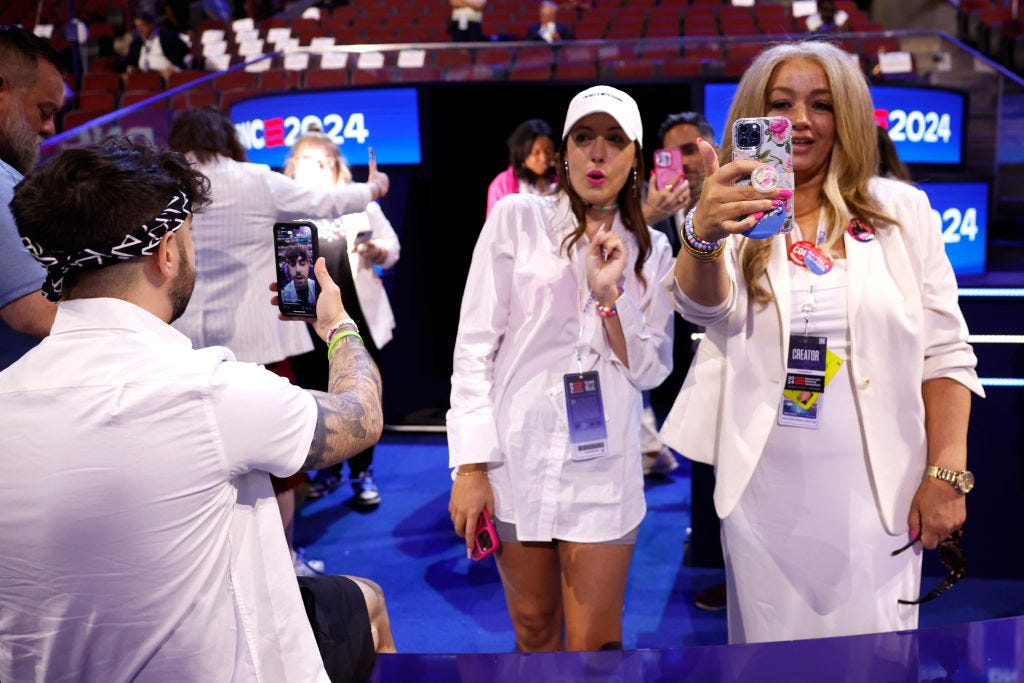TikTok Influencers Take Dark Money for Election Messaging
The FEC lacks any clear payola disclosure rules for payments to individual influencers, but here's an attempt to dig through campaign finance data.
The Democratic Party went all out to wine and dine TikTok influencers at the convention last week.
The party provided content creators with tiki bar parties, a VIP suite at the United Center, a private boat tour on Lake Michigan, and a "blue carpet" with exclusive access to Democratic lawmakers and politicians. Online personalities known for singing, dancing and food reviews were encouraged to post supportive messages about the Harris-Walz presidential ticket.
That much is well-known by now, as many journalists have commented on the party’s velvet glove treatment for TikTok celebrities while slashing credentials for professional reporters.
But what is less known is the sprawling dark money effort to funnel undisclosed cash to social media “influencers.” As Americans, on average, spend about two hours a day scrolling social media, such payments have become critical in the online messaging wars.
Federal Election Commission rules require paid campaign advertising to carry a disclaimer notice identifying who paid for the communication. However, payments to individual influencers represent a grey area of completely unregulated campaign finance.
No federal rules require disclosure when a TikTok star or Instagram personality is paid to promote an election-related message. Although efforts have been made to reform election transparency rules, little has changed. Last December, the FEC formally punted on the issue.
Instead, we have opaque disclosures. Campaign spending disclosures show campaigns showering funds on social media influencer marketing agencies. These agencies act as intermediaries to recruit influencers, facilitate payments, and oversee the messages delivered to users. Which individual social media stars end up getting paid is rarely revealed.
But a review of FEC disclosures shows SuperPACs and political campaigns spending millions of dollars in payments to these influencer marketing agencies:
– The largest non-advertising payment spent by the Harris campaign disclosed so far is a $1.9 million check to Village Marketing Agency, a major firm for booking social media influencers. The company previously worked on the 2020 Biden campaign and several efforts to promote the Obama family. Village Marketing, now a part of the marketing conglomerate WPP Group, is reportedly working to recruit 5,000 social media influencers to promote the Kamala Harris presidential campaign.
– Good Influence, formerly known as Atadvocacy, specializes in generating advocacy campaigns for progressive causes using social media influencers. The company notes that it directly pays influencers for content. “We see real value to paying creators and investing in the creator economy," noted Sabrina Collins-Childers, a digital strategist with the firm, during a presentation posted online. The firm’s creator networking including ConsciousLee, JoJoFromJerz, Josh Helfgott, and PinkMantaray. Several congressional campaigns and the Pennsylvania Democratic Party disclosed payments to the firm.
– Dysrupt LLC is an influencer marketing campaign that touts its work with corporate brands such as Absolut, Gourmet Burger Kitchen, and Fender. FEC disclosures show that the Robert F. Kennedy Jr. campaign has paid the firm at least $383,763 over the last year for consulting work.
– In 2020, Ory Rinat, who served in the Trump White House as chief digital officer, founded Urban Legends and a partner firm called Legendary Campaigns to focus on influencer marketing. Since then, the Trump campaign, affiliated SuperPACs and congressional Republicans have paid the firm over $2.3 million for online advocacy.
– PrioritiesUSA, founded as Obama’s primary SuperPAC during the 2012 reelection campaign, has shifted entirely to digital advocacy. The SuperPAC is paying TikTok personalties to post pro-Kamala Harris content and producing content of its own. In June, PrioritiesUSA gave $10,000 to a firm called Hija Del Nopal Films, which recently posted a casting call for an ad "about Trump's threats to the Latine community if he becomes reelected," which will be "seen through the perspective of a child."



